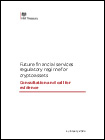Summary
This consultation sets out proposals for the UK’s financial services regime for cryptoassets, and marks the next stage of the UK’s phased approach.
This consultation closes at
Consultation description
In April 2022, the government committed to introducing a new regulatory regime for cryptoassets, reflecting the risks and opportunities they present.
This consultation paper sets out proposals for this future regime and marks the next phase of the government’s approach to regulating cryptoassets. It builds on previous HM Treasury proposals, which focussed on stablecoins and the financial promotion of cryptoassets.
The proposals seek to deliver on the ambition to place the UK’s financial services sector at the forefront of cryptoasset technology and innovation and create the conditions for cryptoasset service providers to operate and grow in the UK, whilst managing potential consumer and stability risks.
The government’s proposed measures have been informed by recent market events – including the failure of FTX – which reinforce the case for effective regulation and sector engagement.
Documents
Future financial services regulatory regime for cryptoassets: Consultation and call for evidence
PDF, 846 KB, 82 pages
Source: Gov.uk




